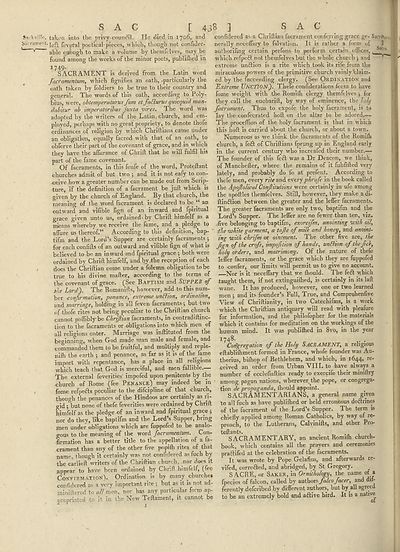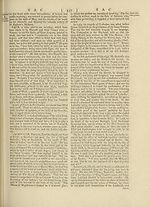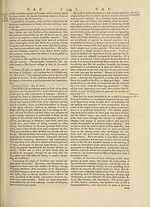Encyclopaedia Britannica, or, a Dictionary of arts, sciences, and miscellaneous literature : enlarged and improved. Illustrated with nearly six hundred engravings > Volume 18, RHI-SCR
(456) Page 438
Download files
Complete book:
Individual page:
Thumbnail gallery: Grid view | List view

SAC
Sfukviltc, taken into the privy-council.
...v„ w,„ He died in 1706, and
Sacrament. feveral poetical pieces, which, though not confider-
r able eubugh to make a volume by themfelves, may be
found among the works of the minor poets, publilhed in
1749-
SACRAMENT is derived from the Latin word
facramentum, which fignifies an oath, -particularly the
oath taken by foldiers to be true to their country and
general. The words of this oath, according to Poly¬
bius, were, obtemperaturus fum et faciums quicquul man-
dabitur ab imperatoribus juxta vires. The word was
adopted by the writers of the Latin, church, and em¬
ployed, perhaps with no great propriety, to denote thofe
ordinances of religion by which Chriftians came under
an obligation, equally facred with that of an oath, to
obferve their part of the covenant of grace, and in which
they have the affurance of Chrifl: that he will fulfil his
part of the fame covenant.
Of facraments, in this fenfe of the word, Proteftant
churches admit of but two •, and it is not eafy to con¬
ceive how a greater number can be made out from Scrip¬
ture, if the definition of a facrament be juft which is
given by the church of England. By that church, the
meaning of the word facrament is declared to be ‘‘ an
outward and vifible fign of an inward and fpiritual
grace given unto us, ordained'by Chrift himfelf as a
means whereby we receive the fame, and a pledge to
affure us thereof.” According to this definition, bap- '
tifm and the Lord’s Supper are certainly facraments.;
for each confifts of an outward and vifible fign of what is
believed to be an inward and fpiritual grace ; both were
ordained by Chrift himfelf, and by the reception of each
/ does the Chriftian come under a folemn obligation to be
true to his divine mafter, according to the terms of
the covenant of grace. (See Baptism and SuPPEB of
the Lord). The Romanifts, however, add to this num¬
ber confirmation, penance, extreme until ion, ordination,
and marriage, holding in all feven facraments; but two
of thofe rites not being peculiar to the Chriftian church
cannot poftibly be CJirifiian facraments, in contradiftmc-
tion to the facraments or obligations into which men of
all religions enter. Marriage was inftituted from the
beginning, when God made man male and female, and
commanded them to be fruitful, and multiply and reple-
nilh the earth ; and penance, as far as it is of the. fame
import with repentance, has a place in all religions
which teach that God is merciful, and men fallible.——
The external feverities' impofed upon penitents by the
church of Rome (fee Penance) may indeed be in
fome refpefts peculiar to the difeipline of that church,
though the penances of the Hindoos are certainly as ri¬
gid ; but none of thefe feverities were ordained by Chrift
himfelf as the pledge of an inward and fpiritual grace ;
nor do they, like baptifm and the Lord’s Supper, bring
, men under obligations which are fuppofed to be analo¬
gous to the meaning of the word facramentum. Con¬
firmation has a better title to the appellation of a fa¬
crament than any of the other five pnpilh rites of that
name, though it certainly was not confidered as fuch by
the earlieft writers of the Chriftian church, nor does it
appear to have been ordained by Chrif! himfelf, (fee
Confirmation). Ordination is by many churches
confidered as a very important rite; but as it is not ad-
miniftered to all men, nor has any particular form ap¬
propriated to it in the New Teftament, it cannot be
Sacit
[ 438 ] SAC
confidered a Chriftian facrament conferring grace, ge- SacraW;
nerally neceffary to falvation. It is rather a form of
authorifmg certain perfons to perform certain offices, ^
which refpeft not themfelves but the whole church ; and
extreme undlion is a rite which took its rife from the
miraculous powers of the primitive church vainly claim¬
ed by the fucceeding clergy. (See Ordination and
Extreme UNCTION). Thefe confiderations feem to have
fome weight with the Romifti clergy themfdvcs ; for
they call the eucharift, by way of eminence, the holy
facrament. Thus to expofe the holy facrament, is to
lay the confecrated hoft on the altar to be adored.—
The proceflion of the holy facrament is that in which
this hoft is carried about the church, or about a town.
Numerous as ive think the facraments of the Romifli
church, a fe£t of Chriftians fprung up in England early
in the current century who increafed their number.—
The founder of this fed was a Dr Deacon, we think,
of Manchefter, where the remains of it fubfifted very
lately, and probably do fo at prefen t. According to
thefe men, every rite and every phrafe in the book called
the Apofiolical Confiitutions were certainly in ufe among
the apoftles themfelves. Still, however, they make a di-
ftin&ion between the greater and the leffer facraments.
The greater facraments are only two, baptifm and the
Lord’s Supper. The leffer are no fewer than ten, viz.
?five belonging to baptifm, exorcifm, anointing with oil,
:the white garment, a tafie of milh and honey, and anoint¬
ing with chrifm or ointment. T he other five are, the
fign of the crofs, impofition of hands, unSlion of the fid,
holy orders, and matrimony. Of the nature of thefe
leffer facraments, or the grace which they are fuppofed
to confer, our limits will permit us to give no account.
—Nor is it neceffary that we ftiould. The fed which
taught them, if not extinguifhed, is certainly in its laft
wane. It has produced, however, one or two learned
men ; and its founder’s Full, True, and Comprehenfive
View of Chriftianity, in two Catechifms, is a work
which the Chriftian antiquary will read with pleafure
for information, and the philofopher for the materials
which it contains for meditation on the workings of the
human mind. It was publifhed in 8vo, in the year
i748* . .
Congregation of the Holy SACRAMENT, a religious
eftablifhment formed in France, whofe founder was Au-
therius, biftiop of Bethlehem, and which, in 1644, re¬
ceived an order from Urban VIII. to have always a
number of ecclefiaftics ready to exercife their miniftry
among pagan nations, wherever the pope, or congrega¬
tion de propaganda, Ihould appoint.
SACRAMENTARIANS, a general name given
to all fuch as have publiffied or held erroneous dodrines
of the facrament of the Lord’s Supper. The term is
chiefly applied among Roman Catholics, by way of re¬
proach, to the Lutherans, Calvinifts, and other Pro-
teftants.
SACRAMENT ARY, an ancient Romifti church-
book, which contains all the prayers and ceremonies
pradifed at the celebration of the facraments.
It was wrote by Pope Gelafius, and afterwards re-
vifed, correded, and abridged, by St Gregory.
SACRE, or Saker, in Ornithology, the name of. a
fpecies of falcon, called by authors falco facer, and dif¬
ferently deferibed by different authors, but by all agreed
to be an extremely "bold and adive bird. It is a native
Sfukviltc, taken into the privy-council.
...v„ w,„ He died in 1706, and
Sacrament. feveral poetical pieces, which, though not confider-
r able eubugh to make a volume by themfelves, may be
found among the works of the minor poets, publilhed in
1749-
SACRAMENT is derived from the Latin word
facramentum, which fignifies an oath, -particularly the
oath taken by foldiers to be true to their country and
general. The words of this oath, according to Poly¬
bius, were, obtemperaturus fum et faciums quicquul man-
dabitur ab imperatoribus juxta vires. The word was
adopted by the writers of the Latin, church, and em¬
ployed, perhaps with no great propriety, to denote thofe
ordinances of religion by which Chriftians came under
an obligation, equally facred with that of an oath, to
obferve their part of the covenant of grace, and in which
they have the affurance of Chrifl: that he will fulfil his
part of the fame covenant.
Of facraments, in this fenfe of the word, Proteftant
churches admit of but two •, and it is not eafy to con¬
ceive how a greater number can be made out from Scrip¬
ture, if the definition of a facrament be juft which is
given by the church of England. By that church, the
meaning of the word facrament is declared to be ‘‘ an
outward and vifible fign of an inward and fpiritual
grace given unto us, ordained'by Chrift himfelf as a
means whereby we receive the fame, and a pledge to
affure us thereof.” According to this definition, bap- '
tifm and the Lord’s Supper are certainly facraments.;
for each confifts of an outward and vifible fign of what is
believed to be an inward and fpiritual grace ; both were
ordained by Chrift himfelf, and by the reception of each
/ does the Chriftian come under a folemn obligation to be
true to his divine mafter, according to the terms of
the covenant of grace. (See Baptism and SuPPEB of
the Lord). The Romanifts, however, add to this num¬
ber confirmation, penance, extreme until ion, ordination,
and marriage, holding in all feven facraments; but two
of thofe rites not being peculiar to the Chriftian church
cannot poftibly be CJirifiian facraments, in contradiftmc-
tion to the facraments or obligations into which men of
all religions enter. Marriage was inftituted from the
beginning, when God made man male and female, and
commanded them to be fruitful, and multiply and reple-
nilh the earth ; and penance, as far as it is of the. fame
import with repentance, has a place in all religions
which teach that God is merciful, and men fallible.——
The external feverities' impofed upon penitents by the
church of Rome (fee Penance) may indeed be in
fome refpefts peculiar to the difeipline of that church,
though the penances of the Hindoos are certainly as ri¬
gid ; but none of thefe feverities were ordained by Chrift
himfelf as the pledge of an inward and fpiritual grace ;
nor do they, like baptifm and the Lord’s Supper, bring
, men under obligations which are fuppofed to be analo¬
gous to the meaning of the word facramentum. Con¬
firmation has a better title to the appellation of a fa¬
crament than any of the other five pnpilh rites of that
name, though it certainly was not confidered as fuch by
the earlieft writers of the Chriftian church, nor does it
appear to have been ordained by Chrif! himfelf, (fee
Confirmation). Ordination is by many churches
confidered as a very important rite; but as it is not ad-
miniftered to all men, nor has any particular form ap¬
propriated to it in the New Teftament, it cannot be
Sacit
[ 438 ] SAC
confidered a Chriftian facrament conferring grace, ge- SacraW;
nerally neceffary to falvation. It is rather a form of
authorifmg certain perfons to perform certain offices, ^
which refpeft not themfelves but the whole church ; and
extreme undlion is a rite which took its rife from the
miraculous powers of the primitive church vainly claim¬
ed by the fucceeding clergy. (See Ordination and
Extreme UNCTION). Thefe confiderations feem to have
fome weight with the Romifti clergy themfdvcs ; for
they call the eucharift, by way of eminence, the holy
facrament. Thus to expofe the holy facrament, is to
lay the confecrated hoft on the altar to be adored.—
The proceflion of the holy facrament is that in which
this hoft is carried about the church, or about a town.
Numerous as ive think the facraments of the Romifli
church, a fe£t of Chriftians fprung up in England early
in the current century who increafed their number.—
The founder of this fed was a Dr Deacon, we think,
of Manchefter, where the remains of it fubfifted very
lately, and probably do fo at prefen t. According to
thefe men, every rite and every phrafe in the book called
the Apofiolical Confiitutions were certainly in ufe among
the apoftles themfelves. Still, however, they make a di-
ftin&ion between the greater and the leffer facraments.
The greater facraments are only two, baptifm and the
Lord’s Supper. The leffer are no fewer than ten, viz.
?five belonging to baptifm, exorcifm, anointing with oil,
:the white garment, a tafie of milh and honey, and anoint¬
ing with chrifm or ointment. T he other five are, the
fign of the crofs, impofition of hands, unSlion of the fid,
holy orders, and matrimony. Of the nature of thefe
leffer facraments, or the grace which they are fuppofed
to confer, our limits will permit us to give no account.
—Nor is it neceffary that we ftiould. The fed which
taught them, if not extinguifhed, is certainly in its laft
wane. It has produced, however, one or two learned
men ; and its founder’s Full, True, and Comprehenfive
View of Chriftianity, in two Catechifms, is a work
which the Chriftian antiquary will read with pleafure
for information, and the philofopher for the materials
which it contains for meditation on the workings of the
human mind. It was publifhed in 8vo, in the year
i748* . .
Congregation of the Holy SACRAMENT, a religious
eftablifhment formed in France, whofe founder was Au-
therius, biftiop of Bethlehem, and which, in 1644, re¬
ceived an order from Urban VIII. to have always a
number of ecclefiaftics ready to exercife their miniftry
among pagan nations, wherever the pope, or congrega¬
tion de propaganda, Ihould appoint.
SACRAMENTARIANS, a general name given
to all fuch as have publiffied or held erroneous dodrines
of the facrament of the Lord’s Supper. The term is
chiefly applied among Roman Catholics, by way of re¬
proach, to the Lutherans, Calvinifts, and other Pro-
teftants.
SACRAMENT ARY, an ancient Romifti church-
book, which contains all the prayers and ceremonies
pradifed at the celebration of the facraments.
It was wrote by Pope Gelafius, and afterwards re-
vifed, correded, and abridged, by St Gregory.
SACRE, or Saker, in Ornithology, the name of. a
fpecies of falcon, called by authors falco facer, and dif¬
ferently deferibed by different authors, but by all agreed
to be an extremely "bold and adive bird. It is a native
Set display mode to:
![]() Universal Viewer |
Universal Viewer | ![]() Mirador |
Large image | Transcription
Mirador |
Large image | Transcription
Images and transcriptions on this page, including medium image downloads, may be used under the Creative Commons Attribution 4.0 International Licence unless otherwise stated. ![]()
| Permanent URL | https://digital.nls.uk/193024635 |
|---|
| Attribution and copyright: |
|
|---|
| Description | Ten editions of 'Encyclopaedia Britannica', issued from 1768-1903, in 231 volumes. Originally issued in 100 weekly parts (3 volumes) between 1768 and 1771 by publishers: Colin Macfarquhar and Andrew Bell (Edinburgh); editor: William Smellie: engraver: Andrew Bell. Expanded editions in the 19th century featured more volumes and contributions from leading experts in their fields. Managed and published in Edinburgh up to the 9th edition (25 volumes, from 1875-1889); the 10th edition (1902-1903) re-issued the 9th edition, with 11 supplementary volumes. |
|---|---|
| Additional NLS resources: |
|

